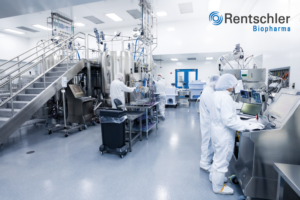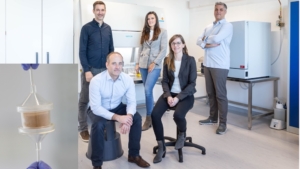
Biomanufacturing in Switzerland
Switzerland is a key hub for biomanufacturing, with immunological products like antibodies and vaccines making up 18.5% of 2024 exports. Swiss companies drive biotech innovation and biocatalysis across sectors globally, extending the traditional focus on pharmaceuticals to fine chemicals, fragrances and food tech. The development is supported by national collaborations and international coalitions.
Switzerland has been home to important scientific developments laying the foundation for biomanufacturing activities worldwide. In addition, state-of-the-art biomanufacturing sites throughout the country enable Switzerland to contribute to the global healthcare supply with therapeutic monoclonal antibodies, biologicals, vaccines and innovative gene therapies. The importance of biomanufacturing in Switzerland is reflected in the proportion of its exports that are biomanufacturing products. In 2024, immunological products accounted for 18.5% (CHF 52.3bn) of Swiss exports. To supply local markets, Swiss companies are also extending their biomanufacturing abroad.
Traditionally, the focus of Swiss biomanufacturing has been on high-value pharmaceuticals. However, biotech approaches are finding wider applications. For instance, Swiss companies have played a key role in the fermentative production of vitamin B2 that has now replaced classical chemical synthesis globally, and they are advancing technologies further. Swiss companies have also been at the forefront of using industrial biotechnology for the sustainable production of flavour and fragrance compounds.
Beyond pharmaceuticals
Furthermore, an increasing number of Swiss companies across sectors integrate biocatalysis into production processes, with key synthesis steps being carried out by enzymes or whole-cell biocatalysts. A key driver has been the Swiss Industrial Biocatalysis Consortium (SIBC). Currently comprising eight companies from the pharmaceutical, fine chemicals, agrochemicals, and flavour and fragrance industries, its members share expertise in a non-competitive setting. With close ties to leading Swiss academic research in biocatalysis, this supports the application of biocatalysis for more efficient and sustainable production processes.
The potential of biomanufacturing and biotechnology-based carbon capture and utilisation (CCU) technologies to replace climate-damaging fossil raw materials with biomass and renewable resources is increasingly being recognised by industry. In the food sector, applications of biomanufacturing, such as biomass- and precision fermentation to produce food and valuable components like animal-free alternative proteins, are progressing from research to development and production. This is being driven by a thriving Swiss food-tech ecosystem.Unlike major economies around the world, Switzerland does not (yet) have a national bioeconomy strategy.
Towards a bioeconomy strategy
The concept of bioeconomy is not yet familiar to political decision-makers or the public. However, a bottom-up development could change this: the Swiss canton of Fribourg, with a strong focus on agriculture and the food sector, is supporting the bioeconomy as a central pillar of its economic development strategy. Positive results could set an example for other Swiss regions. To extend its support for development of biomanufacturing applications, scienceindustries, the Swiss business association Chemistry, Pharma and Life Sciences, recently joined the European Biosolutions Coalition that supports innovation-friendly framework conditions for biotech applications and biomanufacturing beyond the pharma sector in Europe
The author: Dr. Annette Luther is the new President of scienceindustries
Caption to the map: 1 Bavarian Nordic Berna GmbH; 2 Biogen International GmbH; 3 Bristol-Myers Squibb; 4 Celonic AG; 5 Cerbios; 6 CSL Behring; 7 Siegfried DINAMIQS AG; 8 dsm-firmenich; 9 Evitria; 10 ExcellGene; 11 Ferring; 12 Givaudan; 13 Ichnos Glenmark Innovation; 14 Incyte; 15 KBI Biopharma; 16 Kodiak Sciences; 17 LimmaTech; 18 LONZA; 19-20 Merck; 21 Mibelle Biochemistry; 22 MSD; 23-26 Novartis; 27 Om Pharma; 28-29 Roche; 30 T3 Pharmaceuticals; 31 Takeda; 32 The Cultured Hub; 33 Thermo Fisher Scientific; 34 UCB Farchim S.A. ; 35 DSM Nutritional Products (D) ; 36 Novartis (F)


 Rentschler Biopharma SE
Rentschler Biopharma SE TQ Therapeutics GmbH
TQ Therapeutics GmbH U.S. Department of Commerce
U.S. Department of Commerce